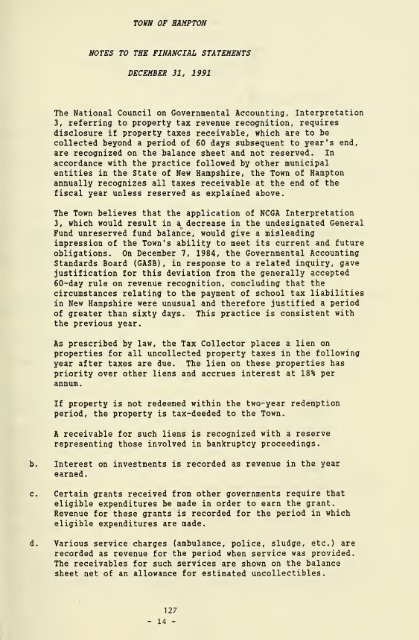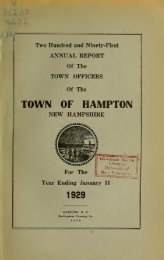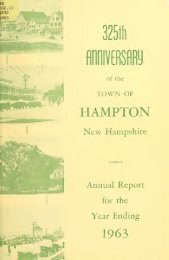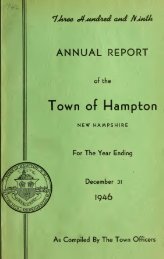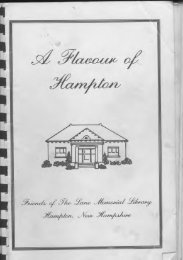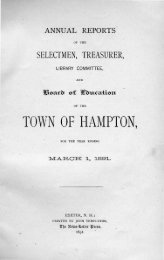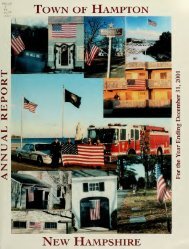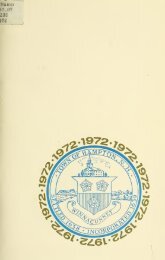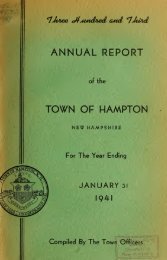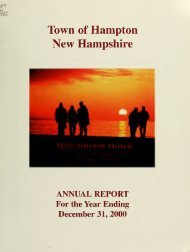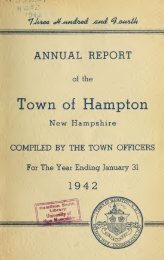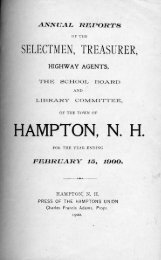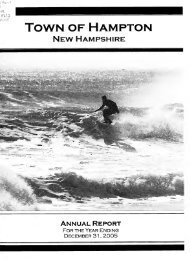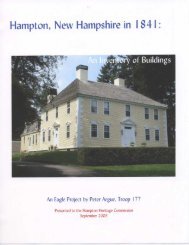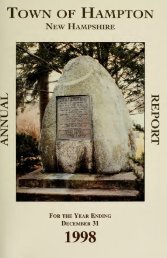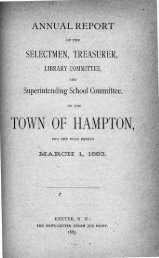Annual report of the Town of Hampton, New Hampshire
Annual report of the Town of Hampton, New Hampshire
Annual report of the Town of Hampton, New Hampshire
Create successful ePaper yourself
Turn your PDF publications into a flip-book with our unique Google optimized e-Paper software.
TOWN OF HAMPTON<br />
NOTES TO THE FINANCIAL STATEMENTS<br />
DECEMBER 31, 1991<br />
The National Council on Governmental Accounting, Interpretation<br />
3, referring to property tax revenue recognition, requires<br />
disclosure if property taxes receivable, which are to be<br />
collected beyond a period <strong>of</strong> 60 days subsequent to year's end,<br />
are recognized on <strong>the</strong> balance sheet and not reserved. In<br />
accordance with <strong>the</strong> practice followed by o<strong>the</strong>r municipal<br />
entities in <strong>the</strong> State <strong>of</strong> <strong>New</strong> <strong>Hampshire</strong>, <strong>the</strong> <strong>Town</strong> <strong>of</strong> <strong>Hampton</strong><br />
annually recognizes all taxes receivable at <strong>the</strong> end <strong>of</strong> <strong>the</strong><br />
fiscal year unless reserved as explained above.<br />
The <strong>Town</strong> believes that <strong>the</strong> application <strong>of</strong> NCGA Interpretation<br />
3, which would result in a^ decrease in <strong>the</strong> undesignated General<br />
Fund unreserved fund balance, would give a misleading<br />
impression <strong>of</strong> <strong>the</strong> <strong>Town</strong>'s ability to meet its current and future<br />
obligations. On December 7, 1984, <strong>the</strong> Governmental Accounting<br />
Standards Board (GASB) , in response to a related inquiry, gave<br />
justification for this deviation from <strong>the</strong> generally accepted<br />
60-day rule on revenue recognition, concluding that <strong>the</strong><br />
circumstances relating to <strong>the</strong> payment <strong>of</strong> school tax liabilities<br />
in <strong>New</strong> <strong>Hampshire</strong> were unusual and <strong>the</strong>refore justified a period<br />
<strong>of</strong> greater than sixty days. This practice is consistent with<br />
<strong>the</strong> previous year.<br />
As prescribed by law, <strong>the</strong> Tax Collector places a lien on<br />
properties for all uncollected property taxes in <strong>the</strong> following<br />
year after taxes are due. The lien on <strong>the</strong>se properties has<br />
priority over o<strong>the</strong>r liens and accrues interest at 18% per<br />
annum.<br />
If property is not redeemed within <strong>the</strong> two-year redemption<br />
period, <strong>the</strong> property is tax-deeded to <strong>the</strong> <strong>Town</strong>.<br />
A receivable for such liens is recognized with a reserve<br />
representing those involved in bankruptcy proceedings.<br />
b. Interest on investments is recorded as revenue in <strong>the</strong> year<br />
earned.<br />
c. Certain grants received from o<strong>the</strong>r governments require that<br />
eligible expenditures be made in order to earn <strong>the</strong> grant.<br />
Revenue for <strong>the</strong>se grants is recorded for <strong>the</strong> period in which<br />
eligible expenditures are made.<br />
d. Various service charges (ambulance, police, sludge, etc.) are<br />
recorded as revenue for <strong>the</strong> period when service was provided.<br />
The receivables for such services are shown on <strong>the</strong> balance<br />
sheet net <strong>of</strong> an allowance for estimated uncollectibles.<br />
127<br />
- 14 -


